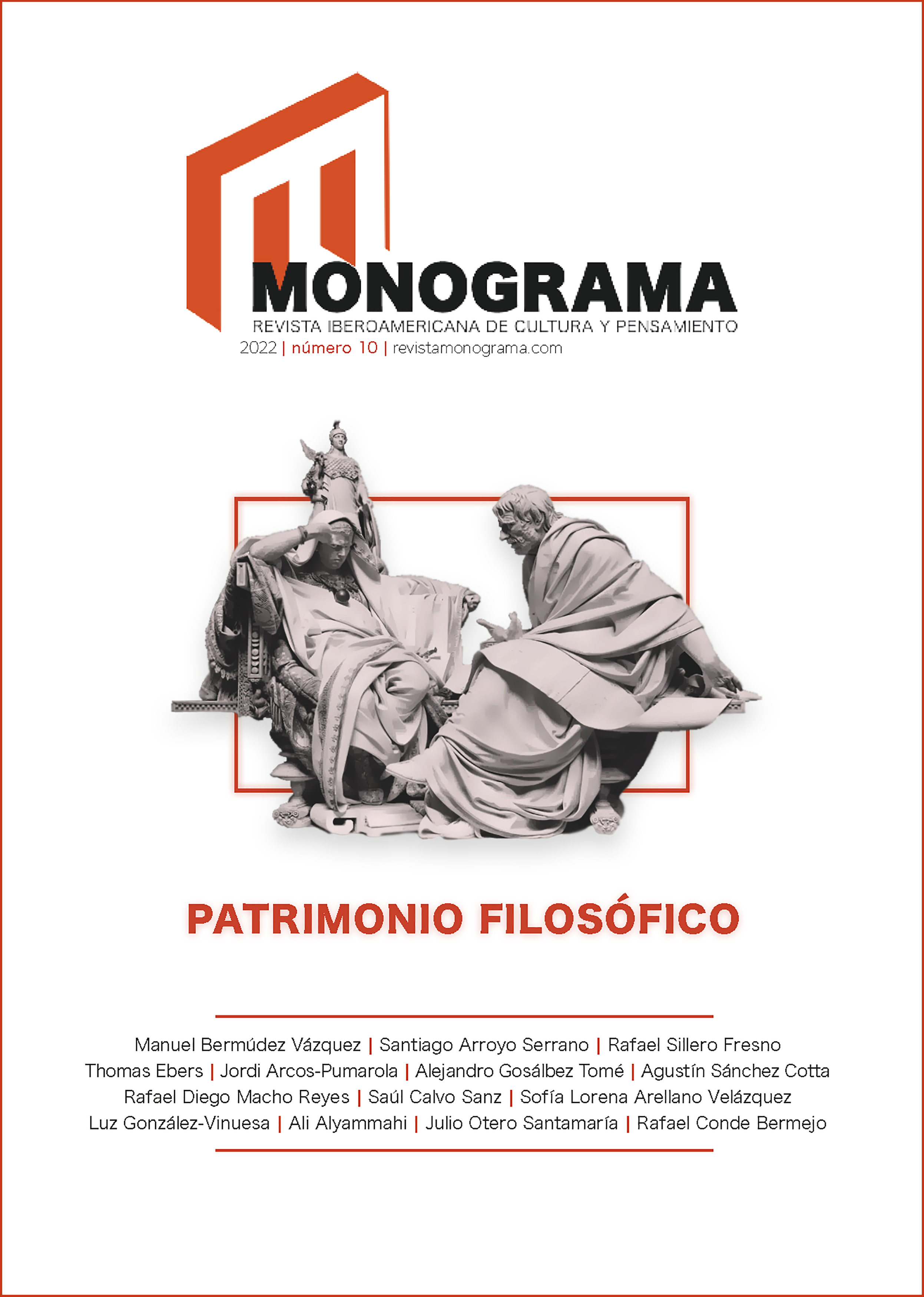Philosophical Heritage: the Value and Necessity of Philosophy
DOI:
https://doi.org/10.36008/monograma.2022.10.0324Keywords:
philosophy, philosophical heritage, humanities, tourism, cultureAbstract
The concept of philosophical heritage refers to the inherited influence of philosophy that has shaped our societies. The way we think, the way we understand reality is a direct heir to the ideas that throughout intellectual history have progressed through philosophical discussion, analysis and criticism. The idea of philosophical heritage has two main approaches that are not at odds with each other. On the one hand, it can be used for the creation of new cultural products to increase the tourist offer of a place and thus foster economic growth. On the other hand, philosophical heritage can be tremendously useful in providing citizens with the appropriate philosophical tools to face the serious challenges that are looming on the horizon of humanity and to strengthen the foundations on which contemporary democracies are built.
Downloads
References
Aramayo, Roberto R. (2020). «Qué le debemos a la filosofía». The Conversation, 18 de noviembre de 2020. Disponible en: https://theconversation.com/que-le-debemos-a-la-filosofia-150300 [consultado el 25 de marzo de 2021].
Arcos Pumarola, Jordi (2016). «Turismo cultural y patrimonio filosófico: un estado de la cuestión». International Journal of Scientific Management Tourism, vol. 2, n.º 3, pp. 41-62.
Arcos Pumarola, Jordi (2017). «Explorando las posibilidades de la didáctica de la filosofía en el campo de la educación patrimonial: el espacio museístico como entorno educador para la filosofía». Quaderns de filosofía, vol. IV, n.º 1, pp. 143-158.
Bermúdez Torres, Víctor (2019). «¿Qué es pensamiento crítico?». El periódico Extremadura, 20/03/2019. Disponible en: https://www.elperiodicoextremadura.com/opinion/2019/03/20/pensamiento-critico-44047537.html [consultado el 25 de marzo de 2021].
Bermúdez Vázquez, Manuel (2016). «El valor y la necesidad de la filosofía en el siglo xxi». En La educación sí importa en el siglo xxi. Madrid: Síntesis, pp. 237-246.
Bermúdez Vázquez, Manuel (2021). «Patrimonio filosófico de Córdoba: un proyecto de turismo alternativo. Un proyecto de ciudad». En Rivera Mateos, M. (coord.). El turismo en Córdoba. Córdoba: UCOPress, pp. 275-282.
Bermúdez Vázquez, Manuel y Casares Landauro, Elena (2021). «Análisis de los mecanismos posverdaderos». En Medios y comunicación en tiempos de posverdad. Madrid: Fragua, pp. 54-70.
Carpio, Adolfo P. (2004). Principios de filosofía. Buenos Aires: Glauco.
D’Agostini, Franca (2000). Analíticos y continentales. Madrid: Cátedra.
Eagleton, Terry (2010). On Evil. Yale: Yale University Press.
Ebbers, Thomas (2014). «Museen als Denkorte. Ein Plädoyer für “Philosophie im Museum”». Standbein Spielbein, n.º 99, pp. 4-7.
García Gual, Carlos (2017). La luz de los lejanos faros. Barcelona: Ariel.
Kinna, Ruth (1992). «Kropotkin and Huxley». Politics, 12 (2), pp. 41-47.
Nussbaum, Martha (2010). Not for profit. Princeton: Princeton University Press.
Ordine, Nuccio (2013). La utilidad de lo inútil. Barcelona: Acantilado.
Ortega y Gasset, José (2015). Misión de la universidad. Madrid: Cátedra.
Ospina, William (2012). Es tarde para el hombre. Bogotá: Mondadori.
Ospina, William (2013). La escuela de la noche. Bogotá: Mondadori.
Ospina, William (2015). La lámpara maravillosa. Bogotá: Penguin Random House.
Sandel, Michael (2013). Lo que el dinero no puede comprar. Madrid: Debate.
Santayana, George (2002). Personas y lugares. Madrid: Trotta.
Sillero Fresno, Rafael (2020). Patrimonio filosófico. Líneas de actuación [TFG defendido en la Universidad de Córdoba].
Vargas Llosa, Mario (2015). Elogio de la educación. Barcelona: Taurus.
Downloads
Published
How to Cite
Issue
Section
License
Copyright (c) 2022 Monograma. Revista Iberoamericana de Cultura y Pensamiento

This work is licensed under a Creative Commons Attribution-NonCommercial-NoDerivatives 4.0 International License.
Esta obra está bajo una licencia de Creative Commons Reconocimiento-NoComercial-SinObraDerivada 4.0 Internacional






